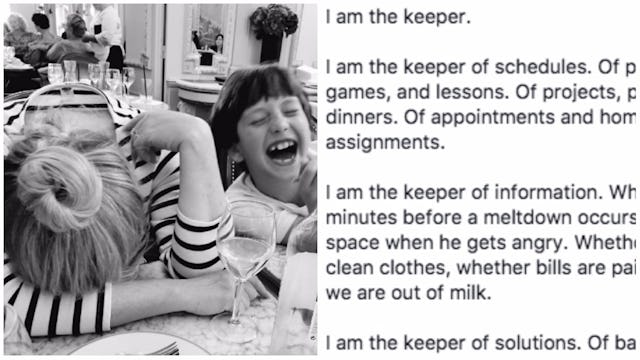Viral Post Nails The Most Exhausting Part Of Being A Mom

Mom’s post, “I Am The Keeper” perfectly nails the mental load of motherhood
The mental load of motherhood is difficult to articulate. Particularly to anyone who isn’t a mother themselves. The daily mental laundry list of things we have to remember and balance to keep our families and households running efficiently is, for lack of a better phrase, a lot.
Mom Cameron Poynter truly gets it. Actually, she not only gets it, but she recently took to her blog’s Facebook page to eloquently share an emotional tribute to fellow moms. Or, as she calls us, “The Keepers.”
“I am the keeper,” she begins. “I am the keeper of schedules. Of practices, games, and lessons. Of projects, parties, and dinners. Of appointments and homework assignments.”
Keeping everything straight and under control in household with children of any age is a monumental task in itself, and more often than not it falls on one parent (usually moms) to be “The Keeper.” But not just when it comes to homework and practices and bills and snacks.
We are relied upon to fix boo-boos of every variety. We are relied upon to provide a level of comfort no one else can. We are our kids’ first teachers when it comes to kindness and manners. We keep peace and harmony in our homes as best we can, because no one else can referee an argument or console a frustrated child like a “keeper” can.
“I am the keeper of rituals and memories. Of pumpkin patches and Easter egg hunts. I am the taker of pictures, the collector of special ornaments, and the writer of letters. I am the keeper of emotional security. The repository of comfort, the navigator of bad moods, the holder of secrets and the soother of fears,” Poynter writes.
If you’re feeling a little misty-eyed right about now, you’re not alone.
“I am the keeper of worry. Theirs and my own. I am the keeper of the good and the bad, the big and the small, the beautiful and the hard.”
The thesis of Poynter’s beautiful post is that sometimes, it feels impossible to balance the weight of our mental and emotional responsibilities. “So many of us who are Keepers – men or women, parents and those without children – question how we are doing,” she tells Scary Mommy.
She’s absolutely right. We never know if our parenting and household management techniques are working. “Our only rubric is the happiness and well-being of our people,” she says.
In her post, she explains why being a “keeper” is by far the most exhausting part of motherhood.
“Most of the time, the weight of these things I keep resembles the upper elements on the periodic table – lighter than air, buoying me with a sense of purpose. But sometimes the weight of the things I keep pulls me down below the surface until I am kicking and struggling to break the surface and gasp for breath,” she writes.
Because we never stop. We never stop worrying, remembering, juggling, and analyzing. It’s why we toss and turn at night, or can’t soothe our own anxieties; we’re too busy trying to soothe everyone else’s. The weight of these things, Poynter writes, is “invisible, intangible” and because of that, our mental load often goes unnoticed by those around us. We don’t need a pat on the back; sometimes we just need to feel seen.
“My husband and my boys are kind and generous and they love me hard,” she writes. “And this is by far the greatest job I have ever had. But sometimes being the Keeper is exhausting. Because you feel like you’re doing it alone.”
Being a mom is inexplicably amazing and fulfilling. It’s also pretty damn isolating sometimes. You feel so removed from your former self and the world around you, sometimes. That’s part of being a “keeper,” too. Everyone is so used to us being the cog in the family machine that keeps everything going, our efforts often go unnoticed.
Which is why Poynter’s words have struck a chord with “keepers” everywhere.
“So to all of you who are keepers, I see you. I know the weight of the things you keep. I know the invisible work you do, which doesn’t come with a pay check or sick leave, is what makes the world go round. I see you. And I salute you.”
This article was originally published on